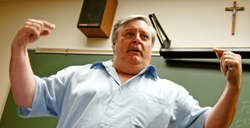Bob Conover will walk with the class of 2005 in Loyola’s commencement ceremony next Saturday. Conover has not attended Loyola University since 1975.
In 1975, Conover graduated a semester early and did not partake in the graduation ceremony. Now, his mother will finally be able to see him graduate.
“The university has allowed me to go through my commencement, 30 years late, and we’re flying my mother down so she can see it.”
Conover, an award winning broadcast professional and Loyola communications graduate, spoke to communications majors this past Tuesday in exchange for a chance to walk.
During his speech, Conover spoke about his long and eclectic career in professional broadcasting, offered students an insider’s perspective on the process of modern broadcasting and speculated on the future of mass communications.
Over the coarse of his career, Conover has worked for ABC, CBS, NBC, ESPN and HBO on news shows, sports broadcasts, documentaries and medical footage. He was a professor of photography at Penn State University and of English composition at the Community College of Rhode Island.
In 1987, Conover won an Emmy Award for editing and directing “The Golden Distance,” a documentary about the early days of the Boston Marathon. In 1990 and 1995, he won Associated Press awards in editing and directing.
Conover has been witness to and involved in many of the changes in broadcasting in the last 30 years. In 1979, Conover witnessed the government cutting off media coverage of the Three Mile Island nuclear disaster in Middleton, Penn. He was one of the first people to ski with a TV camera and recorder at the 1980 Lake Placid Olympics.
From 1980 to 1992, Conover directed commercials for Ginzu knives, which became the prototype for the modern infomercial. In 1988, Conover helped to film and edit some of the first angioplasty operations ever done at Rhode Island Hospital. Eventually his work would be used to present the procedure to doctors from across the country at a medical conference in Hawaii.
Broadcasting technology, Conover said, was instrumental in communicating the potential of the new medical technology.
Broadcasting is a rapidly changing medium, said Conover, and the ways it will be implemented in the future will differ dramatically from the ways in which it has classically been understood.
“Broadcasting was used in a very narrow methodology in that we had a program that would bring viewers to watch it, and the backside of that was the advertisers would have their commercials embedded in it. The formula is going to drastically change in the future.”
Conover cited the Internet as an example of the future of broadcasting. The key, Conover said, will be to find new ways to make money off the new technologies. “There’s going to be some that work,” he said, “and some that don’t work.”
Conover currently works for the Rhode Island NBC affiliate WJAR-TV, directing the Sunrise Show, the top rated morning show in the southern New England area.
Conover received a bachelor’s in communications from Loyola in 1975 and a master’s in administration from Penn State University in 1986.
Kevin Corcoran can be reached at kpcorcor@loyno.edu.







Frederick J Lewis • Feb 28, 2022 at 5:16 am
Bob Conover did not actually direct or edit “THAT Golden Distance. I directed this documentary and independently produced it. The program was edited at WJAR by a union editor. Because of union rules I could not talk directly to the editor. Sitting in a studio control room, I had to tell Conover what I wanted and he relayed the info to the editor who was in master control.
Bob’s credit should have been post production supervisor.
Frederick J Lewis • Apr 25, 2022 at 6:49 am
Without asking me, Conover called the NATAS office in Boston and told them that he was the director and that he should receive an Emmy statuette. This was a disgraceful thing to do.